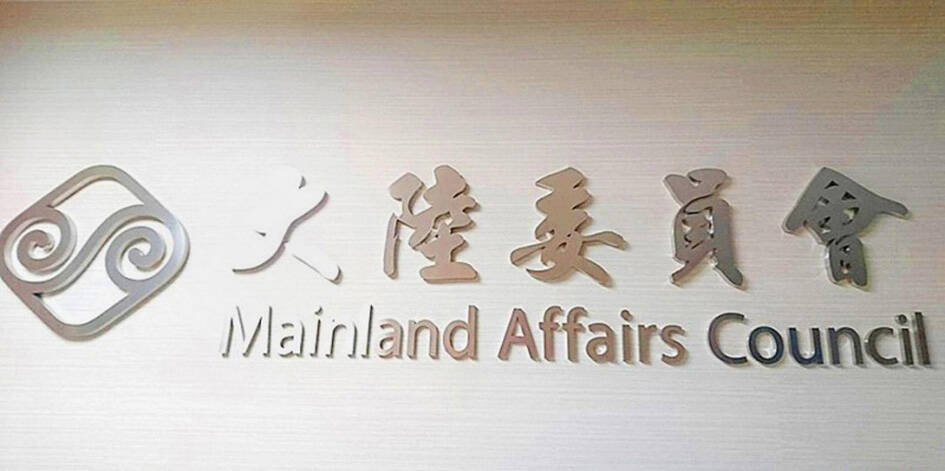About 21 percent of Taiwanese businesspeople in China say they plan to decrease their investment in China, a study funded by the Mainland Affairs Council showed.
The council enlisted an academic institution to investigate the challenges facing Taiwanese investors in China, and their plans to address them.
More than 60 percent of Taiwanese businesspeople based in China invest in the manufacturing industry, with a higher percentage of them involved in the manufacturing of electronics, electronic components, computers and optical products, the study found.

Photo: Chung Li-hua, Taipei Times
The businesspeople said their recent investment decisions were mostly influenced by Beijing’s policy of raising workers’ minimum wage.
The restructuring of the global supply chain — triggered by a trade dispute between the US and China — along with China’s changing environment for foreign investors have led to a decrease in investments in China, the study showed.
Nearly 70 percent of Taiwanese businesspeople said their investment in China would remain unchanged in the next three to five years, while only 10 percent said that they would expand the scale of their investments in China and 21.5 percent said they would decrease their investments.
Meanwhile, 45.4 percent of China-based Taiwanese businesspeople said they had reduced their investment because of geopolitical risks, while 40.2 percent said that demand from China’s domestic market has declined.
A relatively small number of the businesspeople surveyed said they remained positive about the potential of the Chinese market.
Overall, profits earned by Taiwanese businesspeople have declined in the past few years, particularly for those in the cement and construction businesses, the study showed.
About 40 percent said they planned to reduce their production capacity or the number of new employees, as they are more pessimistic about the prospects of the Chinese market.
More than 70 percent said that their investment strategies would be to bolster the research and development of products, branding and marketing, while 40 percent said they would increase their investment in Taiwan, Vietnam and other countries.
About 10 percent said that they are considering closing their businesses in China.
The government should recruit consulting firms to help Taiwanese businesspeople address issues around the withdrawal of their investments in China, the study said.
The government should have a comprehensive plan to attract Taiwanese businesspeople back to Taiwan to set up their operations domestically, it said, adding that the government could also invest in green energy, civil aeronautics and other key industries.
In addition to Taiwan, Taiwanese businesspeople should consider investing in Southeast Asian countries, middle and eastern Europe, South America and Africa, the study said.

STILL COMMITTED: The US opposes any forced change to the ‘status quo’ in the Strait, but also does not seek conflict, US Secretary of State Marco Rubio said US President Donald Trump’s administration released US$5.3 billion in previously frozen foreign aid, including US$870 million in security exemptions for programs in Taiwan, a list of exemptions reviewed by Reuters showed. Trump ordered a 90-day pause on foreign aid shortly after taking office on Jan. 20, halting funding for everything from programs that fight starvation and deadly diseases to providing shelters for millions of displaced people across the globe. US Secretary of State Marco Rubio, who has said that all foreign assistance must align with Trump’s “America First” priorities, issued waivers late last month on military aid to Israel and Egypt, the

‘UNITED FRONT’ FRONTS: Barring contact with Huaqiao and Jinan universities is needed to stop China targeting Taiwanese students, the education minister said Taiwan has blacklisted two Chinese universities from conducting academic exchange programs in the nation after reports that the institutes are arms of Beijing’s United Front Work Department, Minister of Education Cheng Ying-yao (鄭英耀) said in an exclusive interview with the Chinese-language Liberty Times (the Taipei Times’ sister paper) published yesterday. China’s Huaqiao University in Xiamen and Quanzhou, as well as Jinan University in Guangzhou, which have 600 and 1,500 Taiwanese on their rolls respectively, are under direct control of the Chinese government’s political warfare branch, Cheng said, citing reports by national security officials. A comprehensive ban on Taiwanese institutions collaborating or

France’s nuclear-powered aircraft carrier and accompanying warships were in the Philippines yesterday after holding combat drills with Philippine forces in the disputed South China Sea in a show of firepower that would likely antagonize China. The Charles de Gaulle on Friday docked at Subic Bay, a former US naval base northwest of Manila, for a break after more than two months of deployment in the Indo-Pacific region. The French carrier engaged with security allies for contingency readiness and to promote regional security, including with Philippine forces, navy ships and fighter jets. They held anti-submarine warfare drills and aerial combat training on Friday in

COMBAT READINESS: The military is reviewing weaponry, personnel resources, and mobilization and recovery forces to adjust defense strategies, the defense minister said The military has released a photograph of Minister of National Defense Wellington Koo (顧立雄) appearing to sit beside a US general during the annual Han Kuang military exercises on Friday last week in a historic first. In the photo, Koo, who was presiding over the drills with high-level officers, appears to be sitting next to US Marine Corps Major General Jay Bargeron, the director of strategic planning and policy of the US Indo-Pacific Command, although only Bargeron’s name tag is visible in the seat as “J5 Maj General.” It is the first time the military has released a photo of an active